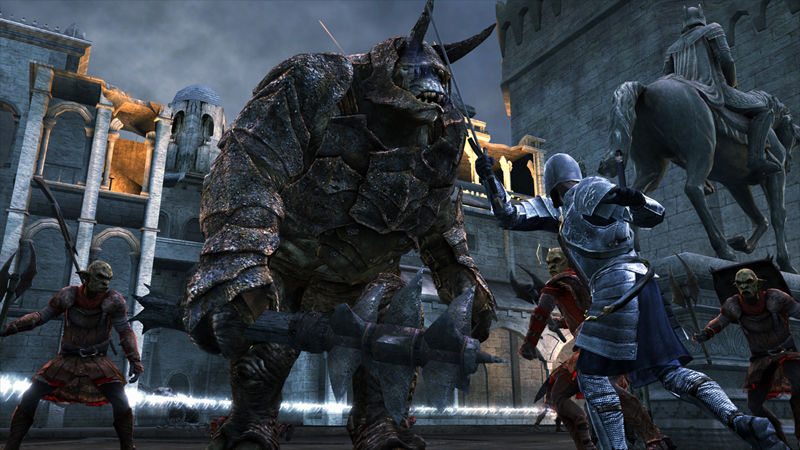eally. Peter Jackson didn't mean for New Line Cinema to take it personally. The kiwi director-impresario caught, out of the corner of his eye, licensing profits from The Lord of the Rings sidling to companies favored by the film trilogy's distributor. In 2005 he spoke up in the very American dialect of litigation. Isn't it the custom to demand suitable compensation for merchandise based on your work? Of the dozen video games bearing the title since 2002, nearly all of them have deferred not to JRR Tolkien's original novels but Jackson's interpretative property. Canonical departures aside, those movies define the look of Middle Earth. Said Jackson to Entertainment Weekly, "I'd love to make another film for New Line." Just perform the contract, thank you.
So Electronic Arts and developer Pandemic Studios enjoyed the cachet accompanying rights to the decade's majestic fantasy series with The Lord of the Rings: Conquest, an action title patterned after Pandemic's popular adaptation of Lucas-lore, Star Wars Battlefront. Pandemic's playful transposition of mythology to team skirmishes might have fit snugly with Jackson's literary illustration — the game's box art, impossibly depicting characters and their counterparts along a line of scrimmage, was glib enough — but does not. In Conquest, EA and Pandemic confess little regard for the movies' vibrance, the genre's potential, or how the industry has evolved since 2005.

Battles turn out much
smaller than advertisedPandemic's default on expectations and promises comes from its diminution of Tolkien's and Jackson's worlds. In Battlefront, the monumental clash of good and not-good could be snipped and summarized, even tartly; here, only trivialized or faked.
The site of Conquest's tutorial level is the battle on Orodruin, in Mordor, between Sauron and heroes of the Second Age — its ineffable carnage Peter Jackson's choice for the opening scene of The Fellowship of the Ring. Surrounded by masses of distant armies, players begin in a small section surrounded by palisades; the bulwarks are torn down by several orcs, whose attacks provide instruction in how to manage a soldier (warrior, scout, mage or archer) of the Alliance. Several waves incur, but there are pauses. During one of them, I pushed my character forward, assuming he was supposed to join the main force. No, not the case — I looked closely. The armies consisted of pairs of man and orc, standing in place, swords glancing as one sharpens a knife with a butcher's steel. Disenchanting, and reflective of Conquest's paucity.
Advancing through a single-player campaign — out-of-order stitchery of engagements from the films — reveals sincere efforts to reenact on a larger scale, and it affords some vivid moments of braving fell swarms or grappling behemoths. But Pandemic restricts most gameplay to cordoned areas or strict paths, while each battle proceeds according to script. The outer walls of Helm's Deep can't be breached until — they in fact can acceptably be breached, after which a few orcs, picked from a crowd, must be cut down inside Theoden's retreat. In other battles, arbitrary locations with no apparent tactical worth — or without significance to the books or the movies — are where players must bash away at a target or repel enemies until a clock runs out.
Pandemic has no excuse for reducing The Lord of the Rings to rote task lists. Koei's Bladestorm: The Hundred Years' War allowed players to shape immense, dynamic and heroic battles that could turn quickly on bold maneuvers — months ago, with nowhere near the brand equity furnished by a filmmaker and philologist author.

a) Bash away at a target or
b) repel enemies until a
clock runs out.Conquest nears Jackson's artistic heights only when snatches from the films play, and is elsewhere grainy, dull, ugly, and despite a colossal milieu, cramped. Hugo Weaving, the falconiform actor who played Elrond in the trilogy, lends gameplay and cutscenes some gravity with his narration, but is Conquest's lone talent; and the repetition of some in-game announcements causes even Weaving's voice to abrade.
Recalling the frivolous, happy time spent four years ago with Battlefront online at a friend's house, I turned to Conquest's multiplayer first. Editor Jeremy Steeves, when I asked, admitted that sports games players have become accustomed to Electronic Arts' intrusion on Xbox Live. I wasn't prepared for the demand that I activate or register a user account. Having reviewed Spore last year, I had already placated EA by agreeing to never play without filling two respective text fields with my e-mail address and some damned password, so entry required only a jog of the memory.
But it's disruptive. Infuriating. Why would Electronic Arts burden its customers with pretensions of an online service for the Xbox 360? Why is the sky blue, why do fish swim in the sea, etcetera. And after all that, multiplayer — smaller, duller, uglier, grainier and, too, inane — is the least favorable to Pandemic's reputation.










































